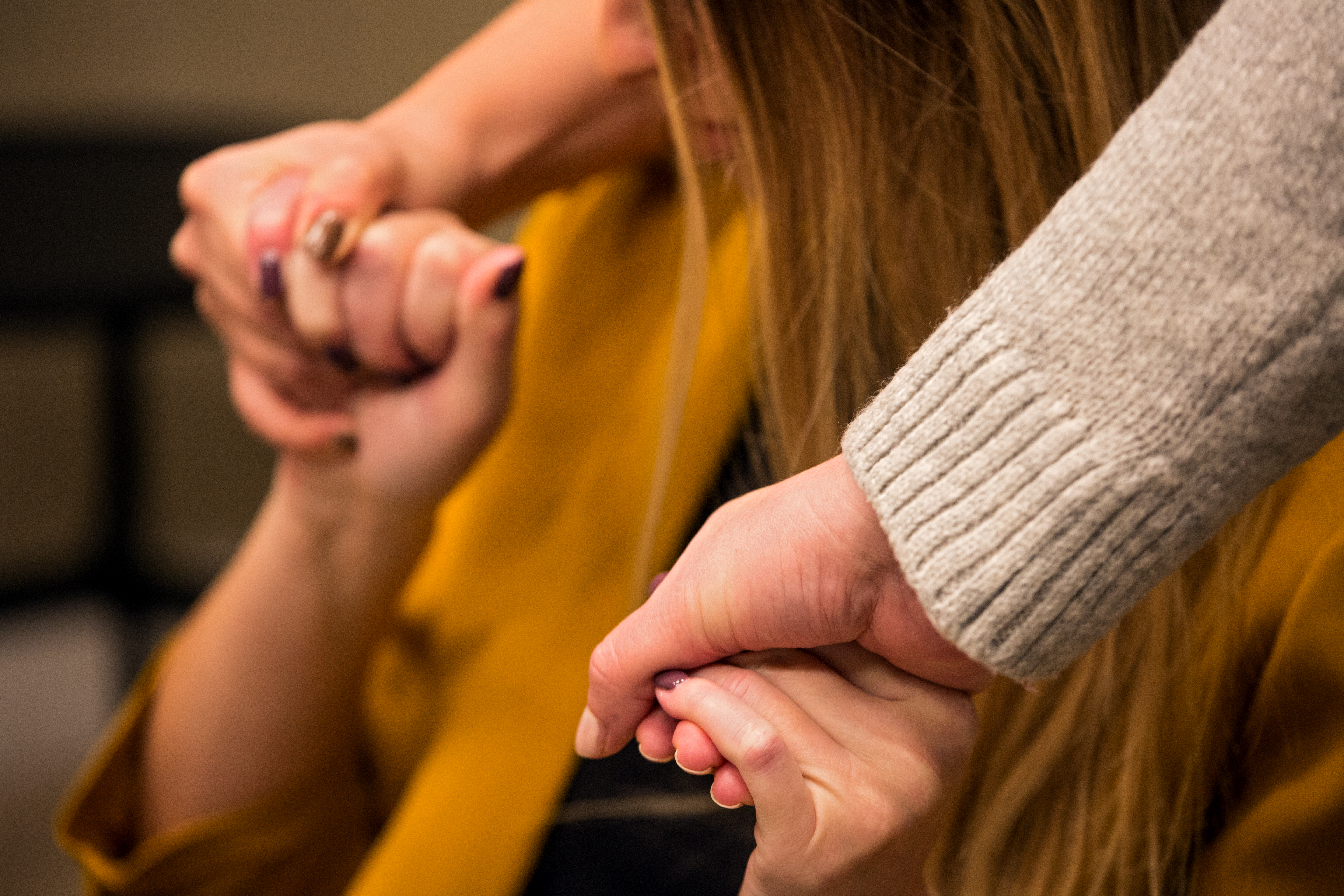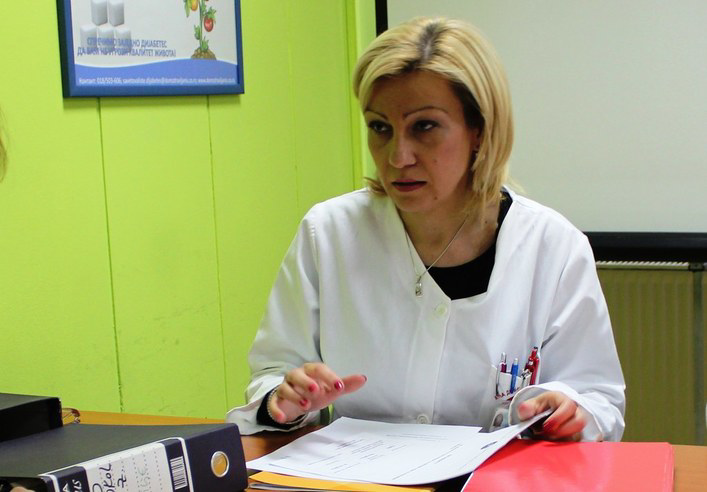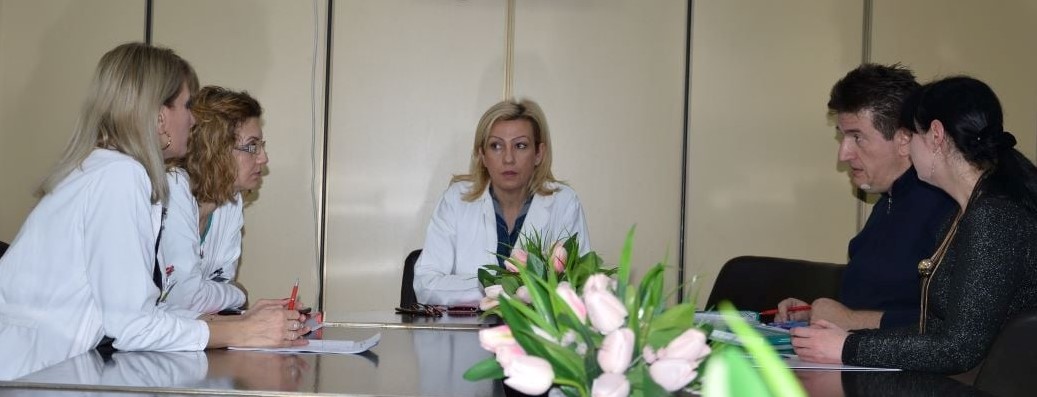How the healthcare system can help prevent violence against women
The Niš heroes and heroines in white coats
September 21, 2023

Community healthcare centres are often the first and only institutions women survivors of domestic violence turn to for help. The level of trust in their doctor and the doctor’s approach to their patient, often determines if women will be encouraged to reveal they are exposed to violence.
Twelve years ago, a group of doctors at the City of Niš Healthcare Centre were among the first in Serbia to independently initiate the forming of a Team for Supporting Women Survivors of Violence (Team). Such a team should be formed in each health centre today.
What motivated them to take this step, was the adoption of the “Ministry of Health’s Special Protocol for the Protection and Treatment of Women Victims of Violence” in 2011. They considered it was necessary for the guidelines in this document to become part of the regular practice of doctors and other medical staff, to better understand the needs of women exposed to violence, be better able to provide medical support and prevent secondary victimization. Based on this protocol, doctors from Niš established their procedures and plan of treatment of patients in situations of domestic or partner-relationship violence.
The “Dr. Milan Jovanović Batut” Institute of Public Health of Serbia acknowledged their procedures as a good practice in 2018, to serve as an example to other healthcare institutions.
The team coordinator is Dr. Lucija Hristov Mitić – general medicine specialist, while team members are professor Dr. Milorad Jerkan – the healthcare centre manager and sports medicine specialist, Dr. Monika Matejić – specialist in obstetrics and gynecology, Dr. Danijela Cvetković – general medicine specialist, head nurse Tatjana Bokić, senior nurse Nataša Nikolić, nurse Ivana Bojić, senior nurse Dragana Zdravković, social worker Aleksandra Popović and psychologist Ana Djurašković.
Doctors have a responsibility to respond to violence
The above-mentioned Protocol of the Ministry of Health prescribes that women survivors of violence who turn to their doctor for help receive urgent treatment compared to other patients, so women who experience violence do not have to wait for a check-up once they report violence to their doctor. The medical examination that follows serves to document the patient’s state, observed injuries and other health conditions that may be a consequence of abuse.
In addition to this, through communication with their patient, doctors may find out whether a survivor’s violent partner possesses firearms (either legally or illegally), about which they inform the police. As representatives of the Niš Healthcare Centre say, together with their patient and in cooperation with other institutions (police and social welfare centre), they assess the risks of violence repeating or escalating and prepare a safety plan for leaving the violent relationship.
In case a doctor suspects that domestic violence has occurred, but there is no clear evidence of it, representatives of the Niš Healthcare Centre turn to the public prosecutor’s office. Survivors’ fear to report violence increases if the perpetrator has access to firearms, while the very reporting of this act or leaving their partner can mean an increased risk of violence escalating or even a tragic outcome.
Dr. Lucija Hristov Mitić, the coordinator of the Niš Team for Supporting Women Survivors of Violence, explains that physical violence is often accompanied by psychological, sexual and economic violence.

Dr Lucija Hristov Mitic
„We can identify psychological violence that occurs together with physical abuse, but psychological violence alone is generally not reported, as survivors do not recognize it, and normalize insults and scorn. When a woman reports physical violence, she usually also reports whether she has received insults or is suffering economic violence”, states Dr. Hristov Mitić.
Doctors treat patients with a full understanding of the consequences of violence-related trauma. Sometimes survivors cannot remember the entire violent event, or they do not believe their own experience and minimalize the violence. They sometimes deny they had been exposed to violence later. These are usual reactions in stressful and traumatic events.
„Depression and anxiety are also common consequences of violence. If a woman often turns to a doctor due to psychosomatic conditions and violence is suspected, the doctor is obliged to refer their patient to a psychologist for further examination and counselling, even when the patient is not explicitly reporting violence”, explains Dr. Hristov Mitić and adds that the psychologist’s role in the Team is to empower women and provide support and information on available options for overcoming violence.
On average, women return to their violent partners eleven times before leaving them for good. That is why it is important that they have the support of institutions every time they turn to them and that there is a common understanding that the woman will leave the violent relationship when she is ready.
According to the Law on the Prevention of Domestic Violence each doctor is obliged to report suspected violence, regardless of the survivor’s readiness to participate in this process.
„We do not need to have concrete evidence, suspecting violence is sufficient for making a report. We organize Team meetings and discuss whether the report should be forwarded to other institutions”, states Dr Hristov Mitić.
The Niš Healthcare Centre registers around 30 to 40 cases of violence annually. Team members are doctors specializing in different fields, so all necessary examinations can be completed in a short time. This means that women do not need to spend a long time going from one doctor to another and lose the will to make an official report. Also, there is a special register of these cases accessible only to medical professionals in the Team, so as to respect doctor-patient confidentiality and patient privacy. Medical documentation in the register can be forwarded to the court or the survivor in case she decides to file a report. This is important for procedures of proving that violence has occurred, so that this does not rely solely on the testimony of the survivors, who often withdraw from participation in proceedings as they are complicated or out of fear.

Meeting of the Niš Healthcare Center team
Cooperation with other institutions
It is significant that the Niš Team for Supporting Women Survivors of Violence has good cooperation with the local social welfare centre, basic and higher prosecutor’s offices, police, women’s safehouse, the “Centre for Girls” women’s civil society organization, as well as with other organizations that have a role in responding to domestic violence cases.
„This is our joint success and effort, one person cannot do everything. It is important to be in contact with others and have their support”, points out Dr. Hristov Mitić, and says it is especially significant for the health institutions’ managers to be in the team. That way, they can learn about the problem of gender-based violence, relevant legal regulations, as well as penalties for doctors and representatives of other institutions if they do not act according to the law. Also, this is the way to achieve understanding, cooperation and gain help in the organization of trainings, participation in workshops and media appearances, which is important for raising citizens’ awareness about this social problem.
The Team in Niš developed its own trainings for healthcare professionals and representatives of other institutions. They accredited their first course in 2014, which also involved the participation of the city social welfare centre, prosecutor’s office, police, media representatives and other relevant local stakeholders. Before the Covid-19 pandemic, these trainings were held up to two times annually, a practice they aim to continue. They also implemented numerous campaigns, handed out leaflets to patients with information on recognizing violence, and marked the global campaign “16 days of activism against gender-based violence” by organizing plays, lectures and discussions at the healthcare centre. Their regular media appearances keep the public eye on this topic throughout the year. Team members say they would name their group “Hope” or “Team for a Better Future”.
Author of the text: Dejana Cvetkovic
***
The Niš Healthcare Centre, together with many other healthcare centres from different cities and municipalities, participated in a series of meetings organized by the United Nations Development Programme (UNDP) in Serbia with the aim of strengthening healthcare institutions’ role in multi-agency response to domestic violence. Answers to dilemmas on possibilities of the healthcare sector to participate in the prevention of domestic violence can be found in the “Together against Domestic Violence“ guidebook (in Serbian).
Meetings with doctors from throughout Serbia were organized as part of the project “Reduce Risk - Increase Safety II” implemented by the United Nations Development Programme (UNDP) in Serbia, with the financial support provided by Germany, Sweden, France, the United Kingdom, the Netherlands and Norway, as well as the support by the European Union, through the United Nations’ Western Balkans SALW Control Roadmap Multi-Partner Trust Fund.

 Locations
Locations